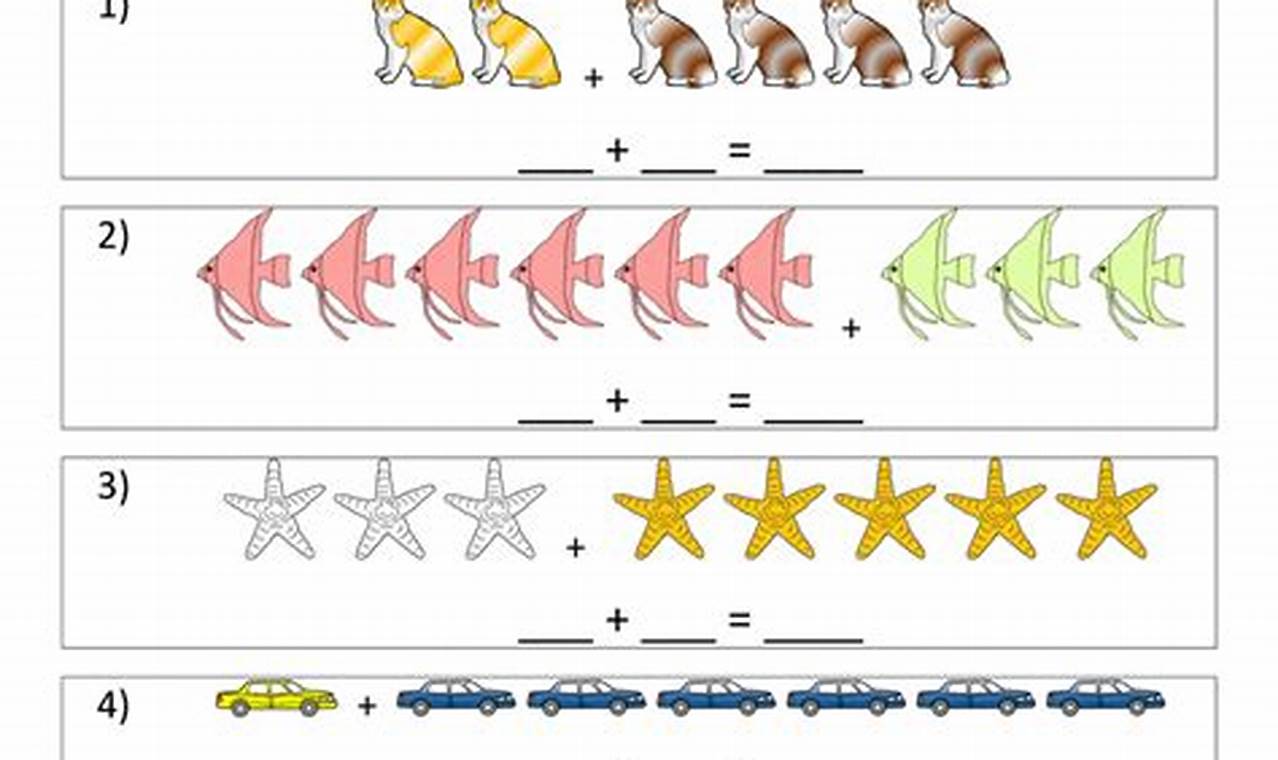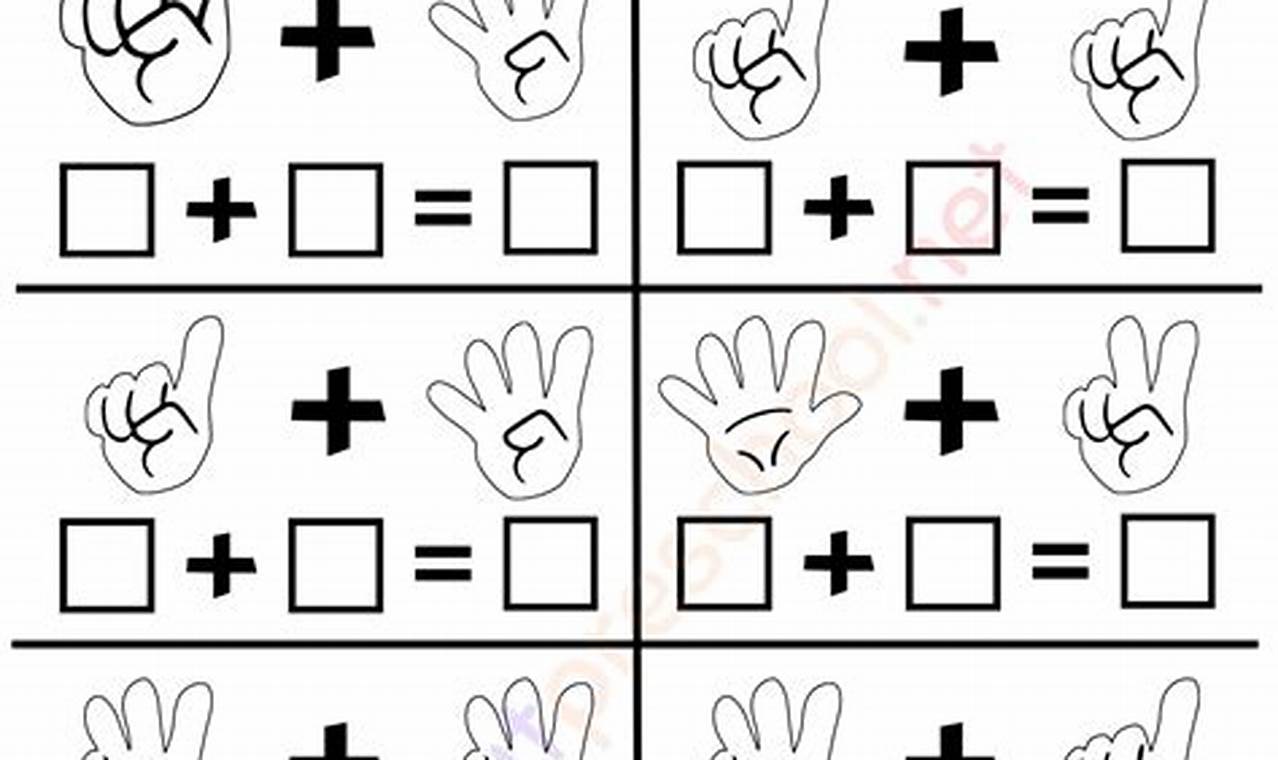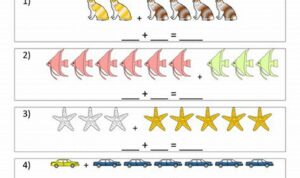Addition worksheets for kindergarten are educational tools designed to help young learners grasp the fundamental concept of addition. These printable worksheets typically feature simple math problems that involve adding two or more numbers together. They may include visual aids like pictures or number lines to make the process more accessible and engaging for kindergarten-aged children.
Incorporating addition worksheets into kindergarten math lessons offers several benefits. They provide a structured and systematic approach to introducing addition, fostering a solid foundation for future mathematical learning. The worksheets help children develop number sense, counting skills, and the ability to recognize and represent numbers. Moreover, by solving addition problems, kindergarteners enhance their problem-solving and critical thinking abilities while strengthening their fine motor skills through writing and manipulating numbers.
Addition worksheets for kindergarten are a valuable resource for educators and parents alike. They can be used as individual practice, group activities, or homework assignments to reinforce concepts taught in the classroom. The worksheets come in varying difficulty levels, allowing teachers to cater to the diverse learning needs of kindergarteners and provide targeted support where necessary.
Addition Worksheets for Kindergarten
Addition worksheets for kindergarten are crucial for building a strong foundation in mathematics. These worksheets introduce the concept of addition, develop number sense, and enhance problem-solving skills in young learners.
- Educational Tool: Addition worksheets provide a structured and systematic approach to teaching addition, making it easier for kindergarteners to grasp the concept.
- Cognitive Development: Solving addition problems strengthens children’s critical thinking and problem-solving abilities, while also improving their number sense and counting skills.
Furthermore, addition worksheets for kindergarten can be tailored to meet the individual needs of learners. For instance, worksheets with visual aids like pictures or number lines can support children who are still developing their number recognition skills. Additionally, worksheets with varying difficulty levels allow teachers to provide targeted support and challenge learners appropriately.
Educational Tool
Addition worksheets for kindergarten serve as an essential educational tool in teaching young learners the concept of addition. Their structured and systematic approach offers several advantages that make it easier for kindergarteners to grasp the concept:
- Addition worksheets typically start with simple addition problems and gradually increase in difficulty, allowing kindergarteners to build their skills gradually and at their own pace.
- Concrete Representation: Many addition worksheets incorporate visual aids, such as pictures or number lines, which help kindergarteners visualize the addition process and make it more concrete.
- Worksheets provide ample opportunities for kindergarteners to practice addition problems repeatedly, reinforcing their understanding and building fluency.
- Addition worksheets often include answer keys or self-assessment sections, allowing kindergarteners to check their own work and identify areas where they need additional support.
By providing a structured and systematic approach to teaching addition, addition worksheets for kindergarten lay a solid foundation for mathematical learning and equip young learners with the skills they need to succeed in future math classes.
Cognitive Development
Addition worksheets for kindergarten play a crucial role in cognitive development by providing young learners with opportunities to solve addition problems. This process strengthens their critical thinking and problem-solving abilities, while also improving their number sense and counting skills. Here’s how:
Critical Thinking and Problem-Solving: Addition problems require kindergarteners to think critically and apply their problem-solving skills to find the correct answer. They must analyze the problem, identify the numbers involved, and determine the appropriate mathematical operation (addition) to solve it. This process helps develop their logical reasoning and problem-solving strategies.
Number Sense: By repeatedly solving addition problems, kindergarteners develop a strong number sense. They learn to recognize numbers, understand their values, and develop an intuitive understanding of number relationships. This foundation is essential for future mathematical learning.
Counting Skills: Addition worksheets often involve counting objects or numbers to solve the problem. This repetitive practice strengthens kindergarteners’ counting skills and helps them develop fluency in counting.
Incorporating addition worksheets into kindergarten math lessons provides a structured and engaging way to foster cognitive development. By solving addition problems, kindergarteners build a solid foundation in mathematics and develop essential skills that will benefit them throughout their academic journey.
FAQs on Addition Worksheets for Kindergarten
Addition worksheets for kindergarten are valuable tools for teaching young learners the fundamentals of addition. However, some common questions and concerns may arise regarding their use and effectiveness.
Question 1: Are addition worksheets necessary for kindergarteners?
Answer: Yes, addition worksheets provide a structured and systematic approach to introducing addition concepts, fostering number sense, and developing problem-solving skills in kindergarteners.
Question 2: How often should kindergarteners use addition worksheets?
Answer: The frequency of using addition worksheets depends on individual learning needs. However, regular practice is recommended, such as a few worksheets per week, to reinforce concepts and build fluency.
Question 3: What types of addition worksheets are appropriate for kindergarteners?
Answer: Addition worksheets for kindergarteners should be age-appropriate and engaging. Look for worksheets with visual aids, simple addition problems, and clear instructions.
Question 6: How can parents support their kindergarteners’ learning with addition worksheets?
Answer: Parents can support their kindergarteners by providing encouragement, reviewing concepts together, and offering additional practice opportunities outside of school.
Summary: Addition worksheets for kindergarten lay a solid foundation for mathematical learning by introducing addition concepts, developing number sense, and enhancing problem-solving skills. Regular use of age-appropriate worksheets, combined with support from educators and parents, can significantly benefit kindergarteners’ mathematical development.
Transition to the next article section: For more information on addition worksheets for kindergarten, including printable resources and lesson plan ideas, please refer to the following section.
Tips for Using Addition Worksheets for Kindergarten
Incorporating addition worksheets into kindergarten math lessons can provide numerous benefits for young learners. Here are some tips to maximize the effectiveness of these worksheets:
Tip 1: Start with Concrete Objects: Before introducing addition worksheets, use concrete objects like blocks or counters to demonstrate the concept of addition. This hands-on approach helps kindergarteners visualize and understand the process.
Tip 2: Use Visual Aids: Addition worksheets with visual aids, such as pictures or number lines, make the learning process more engaging and accessible for kindergarteners.
Summary of key takeaways or benefits: By following these tips, educators can effectively use addition worksheets to foster a strong foundation in mathematics for kindergarteners. These worksheets provide a structured and systematic approach to introducing addition concepts, developing number sense, and enhancing problem-solving skills.
Transition to the article’s conclusion: In conclusion, addition worksheets are valuable tools for kindergarten math instruction. By incorporating these tips into their teaching practices, educators can help young learners develop a solid understanding of addition and lay the groundwork for future mathematical success.
Conclusion
In conclusion, addition worksheets for kindergarten are invaluable tools that provide a structured and systematic approach to teaching young learners the fundamental concept of addition. By incorporating these worksheets into math lessons, educators can foster a strong foundation in mathematics, develop number sense, and enhance problem-solving skills in kindergarteners.
The use of visual aids, engaging activities, and regular practice with addition worksheets helps kindergarteners grasp addition concepts and build fluency. Moreover, these worksheets can be tailored to meet the individual needs of learners, ensuring that all kindergarteners have the opportunity to succeed in mathematics.


